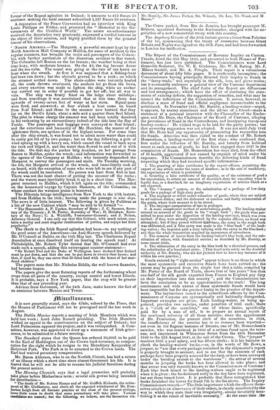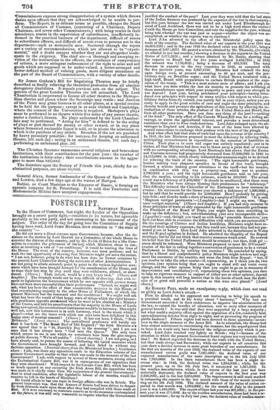Iftistellantous.
It is now generally stated, says the Globe, echoed by the Times, that the Houses of Parliament will not be prorogued until the last week in August.
The Dublin Monitor reports a meeting of Irish Members which was held last week ; Lord John Russell presiding. The Irish Members wished an appeal to the constituencies on the subject of Ireland ; but Lord Palmerston opposed the project, audit was relinquished. A Com- mittee, however, was appointed to draw up a statement of Irish griev- ances, to be submitted to a future meeting.
The Standard states that the Queen has ordered 30,0001. to be paid to the Earl of Haddington out of the Crown land-revenues, as compen- sation for the right which he resigns to the Hereditary Keepership of Holyrood Park. The Park is to be annexed to the Crown lands. The Earl had waived pecuniary compensation.
Mr. Baron Alderson, who is on the Norfolk Circuit, has had a return of an illness which a short time since almost threatened his life. It is feared that he will not be able to resume his judicial functions during the present assizes.
The Morning Chronicle says that a legal promotion will probably take place before Michaelmas term ; several silk gowns being intended for distribution-
" The death of Mr. Sutton Sharpe and of Mr. Griffith Richards, the retire- ment of Mr. Girdlestone, and above all the expected withdrawal of Mr. Pem- berton Leigh from all forensic practice at the close of the present sittings, leave little room to doubt that some promotions will take place. Various candidates are named; but the following, we believe, are the favourites viz.
Mr. Rornilly, Mr. James Parker, Mr. Wilcock, Mr. Lee, Mr. Wood, and M Bacon."
The Crane packet, from Rio de Janeiro, has brought passenger M. Ribiero, appointed Secretary to the Ambassador, charged with the ne- gotiation of a new commercial treaty with this country.
The Augsburg Gazette of the 20th instant quotes a letter from Palermo of the 1st, announcing that the treaty of commerce between Great Britain and Naples was signed on the 26th June, and had been forwarded to London for ratification.
The Report of the Commissioners of Revenue Inquiry on Custom Frauds, dated the 22d May 1843, and presented to both Houses of Par- liament, has just been published. The Commissioners were Lord Granville Somerset, Mr. W. E. Gladstone, Mr. W. B. Baring, Mr. J. Manes Gaskill, and Mr. A. Pringle. Their report is a voluminous document of about fifty folio pages. It is confessedly incomplete; the Commissioners having principally directed their inquiry to frauds in the " fancy-trade," and especially in the silk, lace, and glove trades; but it necessarily embraces a general view of the Customs departmeat and its management. The chief faults of the Report are diffuseness' and bad arrangement ; which have the effect of confusing the state- ments of existing defects, the suggestion of remedies, and what may be termed the reflections of the Commissioners. It serves, however, to disclose a mass of fraud and official negligence inconceivable to the uninitiated. In November 1841, Mr. Burnby, a landing-waiter—urged, it appears, by uneasy conscience and the advice of a friend—made a statement at a personal interview with the Chancellor of the Exche- quer, and Mr. Dean, the Chairman of the Board of Customs, alleging the prevalence of fraud in the Customhouse, and inculpating (wee 4i-one landing-waiters! He wished traps to be laid for the guilty parties; but that unworthy suggestion was not adopted. It was not until July 1842 that Mr. Dean had any opportunity of prosecuting his researches into the frands. Attention was then called to the conduct of Mr. Robert Homersbam, a landing-waiter of the first class ; who confessed that, first under the influence of Mr. Burnby, and latterly from habitual resort to such means of profit, he had been engaged since 1837 in the commission of frauds. Mr. Homersham has since died, from the effect of ill health, aggravated if not caused by anguish of mind under his exposure. The Commissioners describe the following kinds of fraud respecting which they had received specific information-
1. The granting of false certificates by the export-officers, permitting the export of one article under the name of another; as in the case of machinery, the exportation of which is prohibited. 2. Granting a false certificate of the quality, or of the existence of good s for exportation, to obtain an amount of drawback-duty far exceeding what is legally due, or a drawback for an imaginary exportation of articles which are not exported. 3. The " dummy " system, or the substitution of a package of low-duty goods for a package of high-duty goods. 4. The negligent or wilful under-valuation of goods where they are subject to ad valorem duties; and the dishonest or careless and faulty enumeration of the goods, where their amount is to be stated. 5. The improper computation of tare in packages. 6. A more complicated method of undervaluing goods. The landing-waiter entered an account of the goods in his "rough book " ; the goods were per-
mitted -
mitted to pass under the inspection of the landing-sure eyor, which was even invited: if they were actually examined by the superior officers, no fraud was attempted; but if they passed without hindrance, the entry in the rough book was obliterated, and false entry was made in the "blue book" of the land- ing-waiter; the importer paid a duty tallying with the entry in the blue book; and thus the whole transaction acquired an appearance of correctness. 7. The removal of leaves from the landing-waiter's blue hook, and the sub- stitution of others, with fraudulent entries; as described by Mr. Burnby, at some recent trials.
8. The obliteration of the entry in the blue book by a chemical process, and the substitution of a fraudulent entry. [This fraud rests solely on the doubtful authority of Mr. Burnby, who did not pretend that he knew any instance of it within his own practice.) Goods entered by "sight entries" appear to have been those in which the most systematic and extensive frauds have been carried on : the extent may be guessed from the single fact that a table, compiled by Mr. Porter of the Board of Trade shows that of late years" less than one-half of the silk goods exported from France to England pay duty on their importation into this country "; and the Commissioners be- lieve the conclusion to be an approximation to the truth The long continuance and wide extent of these systematic frauds would have been impossible but for the greatest laxity in the practice of the depart- ment. The instructions issued to the subordinate officers by the Com- missioners of Customs are systematically and habitually disregarded. Important examples are given. Each landing-waiter, on being ap- pointed, provides two sureties, under penalties of 500/. each : there is a "clerk of the securities," one of whose duties, specifically paid for by a sum of 40/., is to prepare an annual report of the continued solvency of all those sureties: since the appointment of Mr. Pemberton, the present clerk of the securities, in 1834, the insufficiency of the sureties has in no instance been reported— not even in the flagrant instance of Dennin, one of Mr. Homersham's sureties, who was convicted in 1840 of a serious fraud upon the reve- nue, and imprisoned in Whitecross Street from the 28th December 1840 to the 22d August 1841, at the snit of the Crown. The "jerquer receives 350/. a year salary, and has fifteen clerks : it is his business to check the landing-waiters' books,—or, in the words of Mr. Rowe, a jerquer, to "see that every package contained in the shipmaster's report is properly brought to account, and to see that the contents of each package have been properly assessed for the duty, or have been conveyed under the bonding system to the warehouse " : the arrear of several months in jerquing the books has been allowed to take place; and that arrear was only recently known to the Commistioners of Customs ! Each blue book issued to the landing-waiters ought to be registered when it is given : the booksissued early in the day have been registered, but not those issued later. It is probable that those unregistered blue books furnished the leaves for fraud 7th in the list above. The Inquiry Commissioners remark—" The little importance which the officers them- selves attach to an observance of their orders, is clearly manifested by the way in which they state their own irregularity, almost invariably men- tioning it as the result of inevitable necessitr. At the same time As Commissioners express strong disapprobation of a system which throws duties upon officers that they are acknowledged to be unable to per- form. The Report, in as delicate terms as possible, charges the Board of Commissioners of Customs, (consisting of a Chairman, Deputy Chairman, and seven other Commissioners,) with being remiss in their attendance, remiss in the supervision of subordinates, insufficiently in- formed in the practical business of the department, difficult of access to subordinate officers, and difficult of access even to persons not in the department—such as mercantile men. Scattered through the report are a variety of recommendations, which are allowed to be " experi- mental," and a doubt escapes whether they are not altogether inade- ciliate to the exigency. The chief are—a thorough and sweeping re- vision of the instructions to the officers, the avoidance of compromises of actions, a more stringent enforcement of the right to seize and sell goods which are supposed to be under-valued, a better-arranged and better-defined method of valuing goods, more diligent attendance on the part of the Board of Commissioners, with a variety of other details.
Sir James Graham's Bill for Regulating Theatres may be briefly described as finally relieving the theatrical profession from all obsolete derogatory disabilities. It repeals previous acts on the subject. The patents of the great London Theatres ere left untouched. The Lord Chamberlain is empowered to license all other theatres in the Metropo- litan district and places where the Sovereign may reside ; and Justices of the Peace may grant licences in all other places, at a special session to be held for the purpose ; except in or near Oxford and Cambridge, -where the consent of the Universities is required. Shakspere's plays must be performed in no theatre within five miles of any patent theatre, ander a Justice's licence. No plays unlicensed by the Lord Chamber- lain may be performed. "Acting for hire" is defined to be the acting of plays or part thereof for money or other reward, or in any place 'where fermented exciseable liquor is sold, or in places the admission to 'which is the purchase of any article. Breaches of the act are punished by heavy pecuniary penalties : for instance, for keeping an unlicensed theatre, 20/. each day ; acting in an unlicensed theatre, 10/. each day ; performing an unlicensed play, 50/.
The Christian Spectator enumerates several religious and benevolent Institutions, with their contributions for the past year : the number of the institutions is forty-nine ; their contributions amount in the aggre- gate to more than 820,000/.
The distraints upon the Society of Friends this year, chiefly for ec- clesiastical purposes, are about 10,000/.
General Alava, former Ambassador of the Queen of Spain in Paris and London, died a few days ago at the waters of Bareges.
Rnbini, as Court Musician to the Emperor of Russia, is forming an operatic compan3 for St. Petersburg. It is said that Tamburini and Iklademoiselle Moltini have accepted engagements.



























 Previous page
Previous page